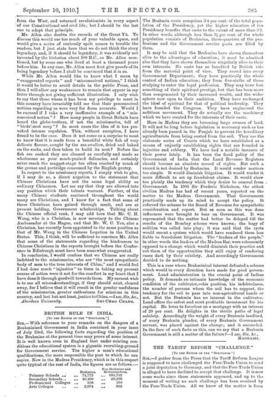BRITISH RULE IN INDIA.
[TO THE EDITOR OF THE "SPECTATOR:1
SIB.,-'With reference to your remarks on the dangers of a Brahminised Government in India contained in your issue of July 23rd, the following facts regarding the position of the Brahmins at the present time may prove of some interest. It is well known even in England that under existing con- ditions the educational system is a gigantic recruiting-ground for Government service. The higher a man's educational qualifications, the more responsible the post to which he can aspire. Now in the Madras Presidency, which is in this respect quite typical of the rest of India, the figures are as follows :- Non-Brahmins and
Brahmins. Mohammedans.
Primary Schools ... 74,772 ... 685,702 Secondary Schools... ... 49,460 ... 68,236 Professional Colleges 508 ... 160 Arts Colleges ... ... 2,974 892 The Brahmin caste comprises 3.4 per cent. of the total popu- lation of the Presidency, yet the higher education of the Presidency benefits that caste to the extent of more than 3.1. In other words, although less than 34 per cent. of the whole population consists of Brahmins, three-quarters of the pro- fessions and the Government service posts are filled by them.
It may be said that the Brahmins have shown themselves alive to the advantages of education ; it must be admitted also that they have shown themselves singularly alive to their own interests. No caste has so benefited by British rule from the material point of view. They crowd into every Government Department; they have practically the whole control of Indian education; they form five-sixths of those studying to enter the legal profession. They may have lost something of their spiritual prestige, but that has been more than compensated by their increased wealth, and the wider sphere now open to their ambition. They have exchanged the ideal of spiritual for that of political leadership. They have founded the Congress. They have engineered the seditious movement. They do actually use the machinery which we have created for the interests of their caste.
Here in Madras they are becoming large owners of laud. It will not be long before legislation is necessary such as has already been passed in the Punjab to prevent the hereditary agriculturists from being ousted from the soil. They use the elaborate series of Courts which we have established as a. means of unjustly establishing rights that are founded in injustice and robbery. We have had a notable instance of their power lately. It has been the fixed policy of the Government of India that the Land Revenue Registers should become an absolute record of rights. But such a record is not desired by Brahmins. It would render matters too simple. It would diminish litigation. It would render it more difficult to set up fraudulent claims. It would show too plainly the tendency which they desire to conceal from Government. In 1905 Sir Frederic Nicholson, the ablest civilian Madras has had of recent years, reported on the matter to the Madras Government. That Government practically made up its mind to accept the policy. It referred the scheme to the Board of Revenue for sympathetic consideration and report. But as soon as this was done influences were brought to bear on Government. It was represented that the matter had better be delayed till the results of the Bombay scheme were known; the bogy of sedition was called into play ; it was said that the ryota would resent a system which would have rendered them less liable to fraudulent litigation. The "leaders of the people," in other words the leaders of the Madras Bar, were vehemently opposed to a change which would diminish their practice and rob them of the opportunities they still enjoy of rendering cases dark by their subtlety. And accordingly Government decided to do nothing.
This is a case where Brahminical interest defeated a scheme which would in every direction have made for good govern- ment. Land administration is the crucial point of Indian policy. It demands an intimate knowledge of the economic condition of the cultivator,—his position, his indebtedness, the number of persons whom the soil has to support, the tendency for the soil to pass into non-agricultural hands or not. But the Brahmin has no interest in the cultivator. Land offers the safest and most profitable investment for his capital. He loves to foreclose on a mortgage with an interest of 20 per cent. He delights in the sterile paths of legal subtlety. Accordingly the weight of every Brahmin landlord, of every Brahmin pleader, of every Brahmin Government servant, was placed against the change; and it succeeded. In the face of such facts as this, can we say that a Brahmin Government is still a matter of the future P —I am, Sir, &c.,
MADEASSI.






































 Previous page
Previous page